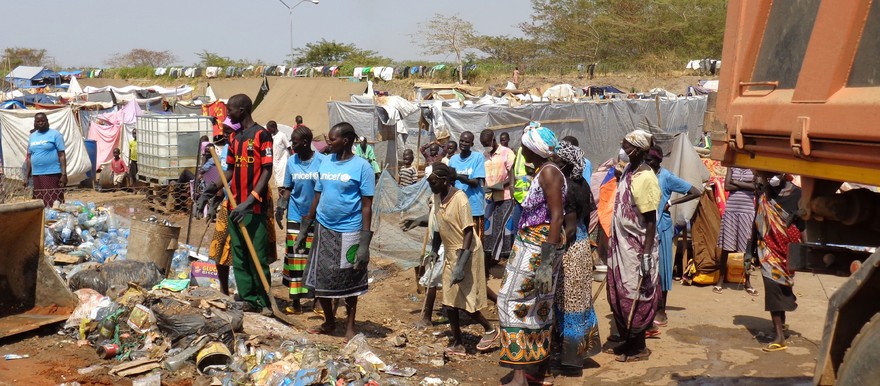UN Emergency Relief Coordinator Valerie Amos has declared the crisis in South Sudan a ‘Level 3 emergency,’ a designation that represents the highest level of humanitarian crisis.
Three other crises in the world are currently sharing the same emergency status: Syria and the Central African Republic, where there are also civil wars, and the Philippines, which was hit by a powerful storm in November last year.
“The declaration will trigger more resources from UN agencies and NGOs, and fast-track administrative procedures for the response,” the UN explained.
OCHA, the UN Office for the Coordination of Humanitarian Affairs, released on Friday another situation report on the crisis in South Sudan, highlighting again the consequences of overcrowding at the UN bases in Juba.
More than 27,500 people are living at the UN base in Juba Tongping. The UN has been warning that there is not enough space to decommission latrines and build new ones.
Currently there are 260 latrines at the site, which means there is about one latrine per every 106 people; standard humanitarian practice calls for 1 latrine per 50 users.
Besides the sanitation issue, some communicable diseases have spread among children at the bases in Bor and Juba, such as measles. “Mortality rates of children under five years in Juba and Bor remain above emergency thresholds,” the report stated.
The UN agency noted, however, that the mortality rates at the Juba base “are slightly declining,” a change the aid agency attributed to improving services in the fields of health, nutrition and sanitation.
Overcrowding at the UN bases is caused by the fear of displaced people to return to their homes, owing to their ethnicity, as well as government delays in allocating more space for the displaced at sites outside the bases. More than 43,000 people shelter at two UN bases in Juba, almost all of them ethnic Nuers.
OCHA also explained that the overcrowding has affected the learning opportunities provided to children of the displaced: “There is a lack of space to set up learning spaces due to congestion in displacement sites.”
Education NGOs have also been providing some psychosocial support to children at UN bases in Bentiu, Bor and Juba. But the UN report says, “a stronger presence of credible education partners is needed with good logistical and surge capacity.”
Water and sanitation services provided by the ‘WASH cluster’ group of NGOs require more funding to continue, according to the UN agency, and more experienced aid organizations are needed, “in order to negotiate access and work in remote, insecure areas.”
“There continues to be funding gaps for many partners as the scale up continues, and initial injections of emergency funding are expended,” the UN agency stated.
Photo: Displaced people living in UN base Juba Tongping volunteer with garbage collection, 9 January 2014 (Radio Tamazuj)
Related:
Key humanitarian updates, 12 Feb.
Key humanitarian updates, 9 Feb.
Key humanitarian updates, 4 Feb.
Key humanitarian updates, 31 Jan.
Key humanitarian updates, 28 Jan.




